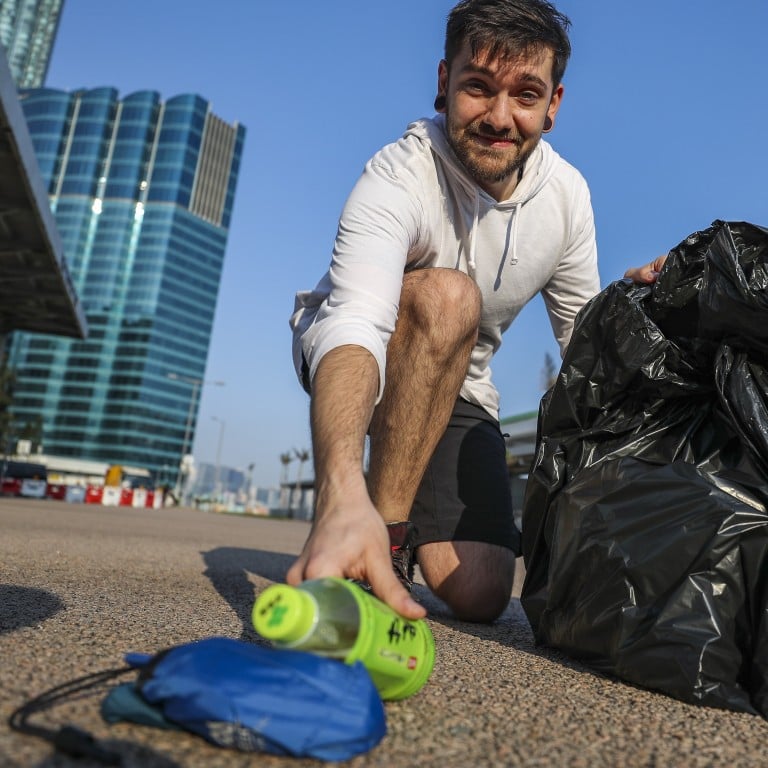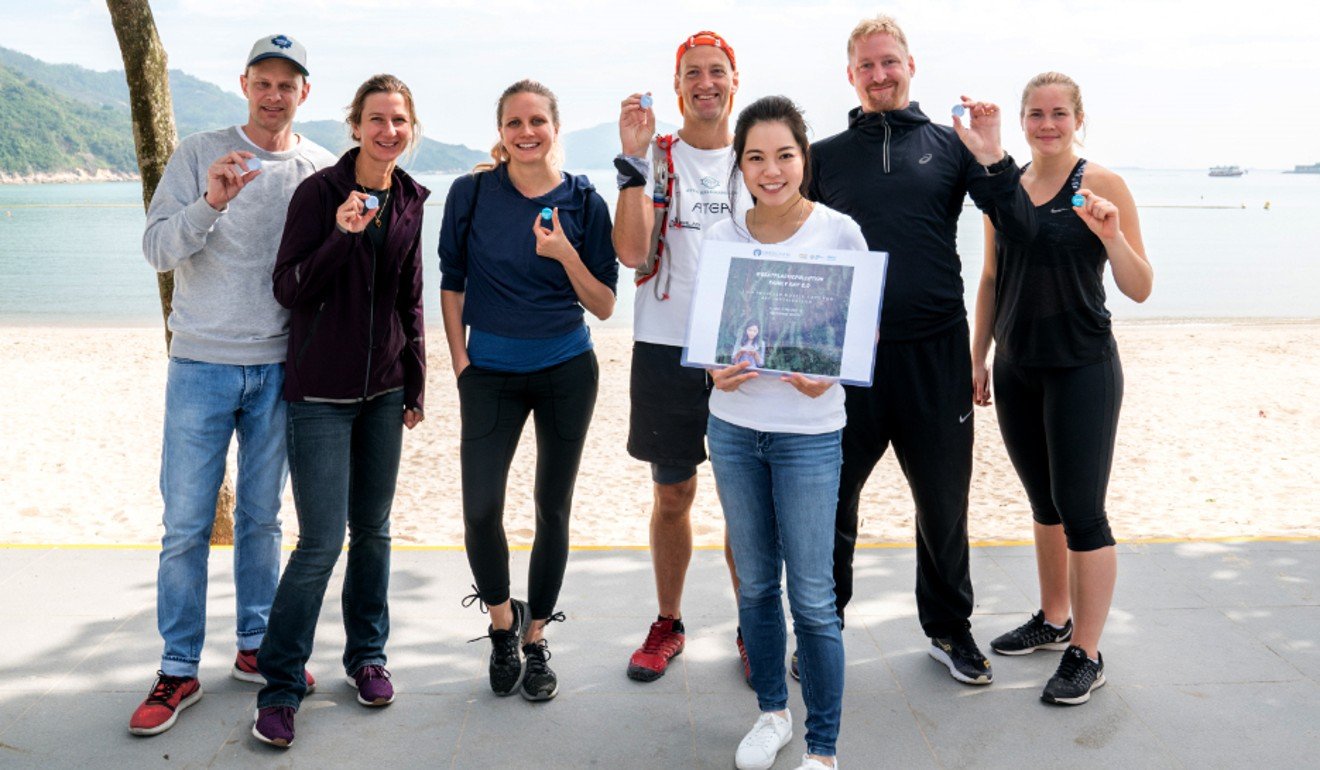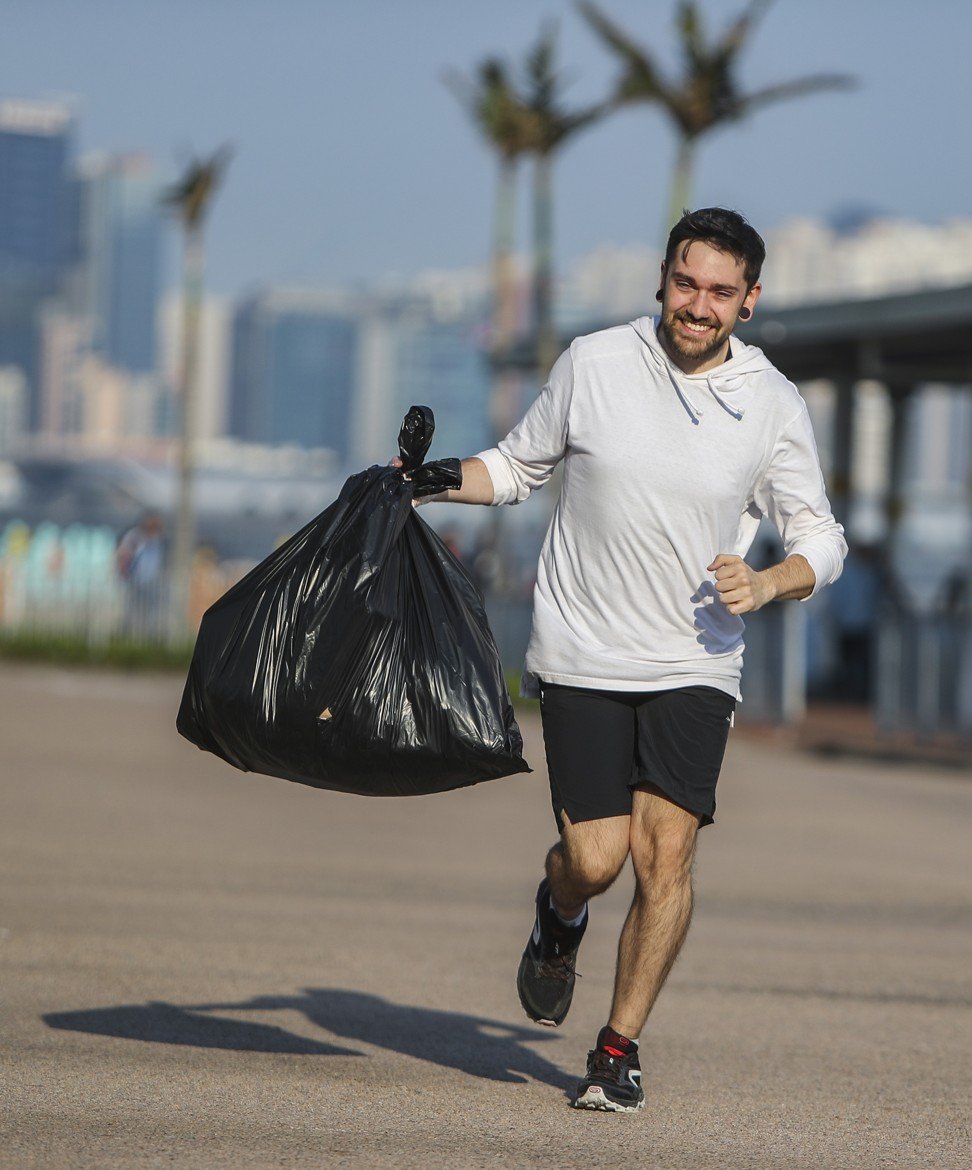
Plogging – the new Swedish fitness trend that combines exercise with environmentalism comes to Hong Kong and here’s how you can join in
- Plogging originated in Sweden and is a mash-up of jogging and the Swedish “plocka upp”, meaning pick up
- Teacher James Marlow set up HK Ploggers and organises a run every two weeks
After a day in the classroom, Hong Kong teacher James Marlow puts on his running gear and grabs a bin bag and goes plogging – a new fitness trend that is an eco-friendly way to exercise.
“The great thing about plogging is … people can do something good not only for themselves but also the environment,” says Marlow, the organiser of the plogging group – HK Ploggers.
Plogging originated in Sweden and is a mash-up of jogging and the Swedish “plocka upp”, meaning pick up.
Marlow, 26, from Birmingham in Britain, started organising plogging workouts in Hong Kong last September after watching videos posted by ploggers in other countries.
“I had organised beach clean-ups before, but when I came across plogging, I thought ‘Why not try something new?’” says Marlow, who teaches STEM – science, technology, engineering and mathematics – at Ma Tau Chung Government Primary School in Hung Hom.
All a plogger needs is running gear, gloves and a bin bag.

Marlow organises a plog every two weeks, usually in urban areas such as Tsim Sha Tsui, Wan Chai or Sai Ying Pun. It takes two to three hours in which ploggers run up to 10km plus while picking up rubbish.
By adding regular bending, squatting and stretching from picking up litter to jogging, plogging increases exercise intensity and burns more calories.
Picking up rubbish distracts my mind so I feel less tired
According to Swedish-based fitness app Lifesum, 30 minutes of jogging plus picking up rubbish burns 288 calories, compared with 235 calories burned by normal jogging.
“Before plogging, I used to work out in a gym. I couldn’t run for more than 5km on a treadmill,” Marlow says.
“Plogging has made me appreciate running more. Picking up rubbish distracts my mind so I feel less tired. Now my goal is to complete a marathon.”
Hong Kong has a chronic waste problem which has only been worsening.
Some 10,733 tonnes of municipal solid waste were sent to the city’s landfills every day in 2017, mostly food waste, paper and plastics, up 3.7 per cent from that of 2016, according to statistics from the Environmental Protection Department.
That means each person disposed of an average of 1.45kg of waste daily, compared with 1.41kg in 2016.
Marlow and his fellow ploggers, whom he refers to as “green ambassadors”, fill up to 20 bin bags while plogging – mostly cigarette butts, food boxes, cutlery and plastic bottles. But they also pick up small Buddhist shrines used to burn incense and even syringes.
“We picked up thousands of cigarette butts,” says 34-year-old Carrie Yip Ka-lai, who works in purchasing. “Since I started plogging, I have found cigarette butts dumped everywhere and they are so often ignored by people. It’s terrible.
“I hope more people will learn about Hong Kong’s waste problem through activities like plogging,” she says.
Almost quarter of plastic bottles washed up on Hong Kong beaches come from Coca-Cola Company
Colin Ho Hing-for, 31 and a financial planner, is a regular plogger. He used to do volunteer clean-ups before joining Marlow.
“If we don’t do it, the rubbish will stay for a long time, even forever, and the next generations will be affected by pollution in the air, food and water they drink. We will live with rubbish and soon we won’t be able to overcome it as it is too much,” he says.
Environmental protection groups welcome the efforts made by Hong Kong ploggers.
“Plogging … adds value to outdoor activities and helps raise public awareness on litter,” says Edwin Lau Che-feng, executive director of Green Earth. “It is more convenient for participants in urban areas, and we will see more people take part in it.”
Despite the surging popularity of plogging in Europe and the United States, the fitness trend is yet to blossom in Hong Kong.
For the first plog in Sham Shui Po in September last year, only one person turned up, Marlow recalls. The two of them jogged for two hours, picking up rubbish in the neighbourhood.

Thanks to Facebook and Instagram, Marlow’s plogging group has since grown to about 20 members who join him for regular clean-up runs. The group’s Facebook page has more than 1,000 followers.
“We are building a community. It’s not just about running and picking up rubbish. It’s more about sharing ideas and encouraging each other to do something good for the community,” he says.
Marlow and his plogging group are not alone in raising awareness of environmental activity in Hong Kong.
Most of Hong Kong and Taiwan’s dumped plastic bottles come from mainland China – but local drinks makers also urged to reduce waste
The Sustainability Committee of the Swedish Chamber of Commerce in Hong Kong organised a plog in December last year. Setting out from Discovery Bay, 10 ploggers collected waste along a 5km route to Mui Wo, filling 14 bags with rubbish, including chunks of foam containers and plastic bottles.
“We had several other hikers thank us and one woman even started picking rubbish herself,” says Alexander Mastrovito, chairman of the committee.

“There is a strong tradition of community involvement in taking care of our environment in Hong Kong.”
In June last year, chief minister of the Malaysian state of Penang, Chow Kon Yeow went plogging with other state leaders to promote the activity.
In Taiwan, a group named Plogging Taiwan which has more than 500 Facebook followers has organised a weekly plog since September last year. The group has recorded 258 hours of running with a distance of 472km, and picked up 5,194 plastic bottles, 1,193 cans, 583 straws and 893 cigarette butts, according to figures on its Facebook page.
Looking forward, Marlow plans to create more plogging runs with different intensity levels, hoping the trend will catch on.
“There is a huge throwaway culture in Hong Kong. We still have a long way to go,” he says.


